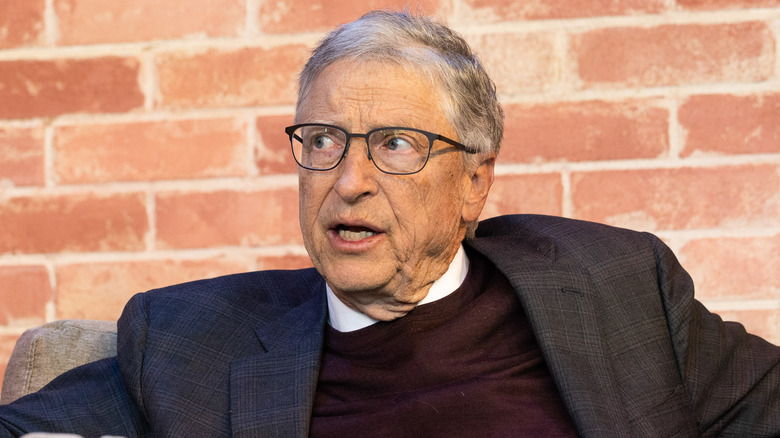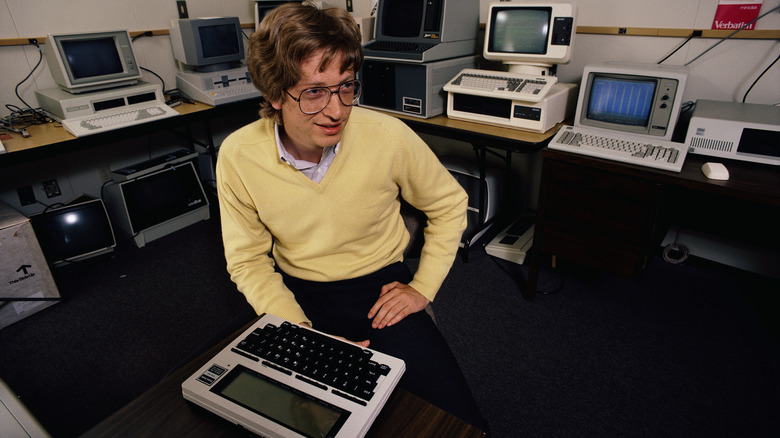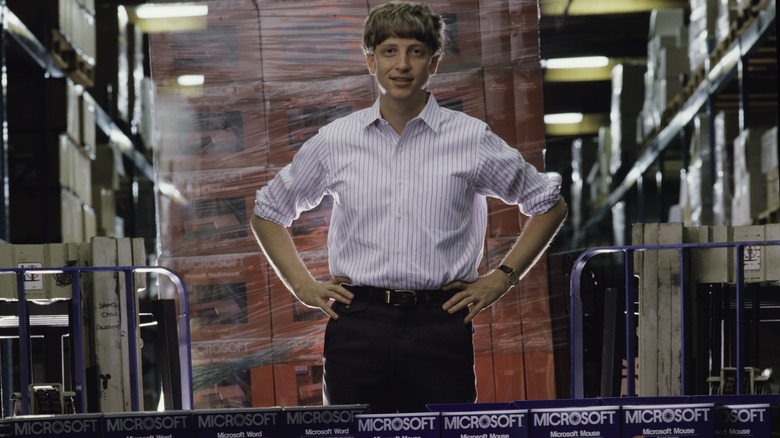What Bill Gates' Former Employees Say He's Really Like
Microsoft co-founder and one of the wealthiest men in the world, Bill Gates, prides himself on being a competent boss. Unlike his contemporaries, who earned a reputation for being too intense, Gates says he adopts a gentler leadership approach. "Everybody is different. Elon [Musk] pushes hard, maybe too much. Steve Jobs pushed hard, maybe too much," he said in December 2023 after receiving the Peter G. Peterson Leadership Excellence Award from the Economic Club of New York (via Business Insider). "I think of myself as very nice compared to those guys." His statement may be true these days, but it certainly wasn't when Microsoft was just a fledgling company.
To be fair, Microsoft has undergone a drastic transformation over the years. In 2023, Time crowned the tech company the World's Best Company, boasting an Employee Satisfaction Rank of #1. A report from Microsoft noted that they had made considerable strides in closing the pay gap for women and people of color, both within and outside the U.S. According to its CEO Satya Nadella, the company is 100% committed to employee satisfaction. "Our mission is to empower every person and every organization on the planet to achieve more," he told the outlet. "So to me, that is a great way to create better-paying jobs, more empowering jobs—jobs that give people more meaning."
This certainly wasn't the case when Microsoft was finding its footing in the tech industry. In its early years, Gates mostly called the shots, and according to his employees, not only was he a micromanager, but he also tended to be overly critical.
Gates used to be a textbook micromanager
During Microsoft's formative years, Bill Gates was known for his relentless work ethic, which often translated into immense pressure on his employees. In an essay for Vanity Fair, late Microsoft co-founder Paul Allen wrote that the company once harbored a demanding work culture due to Gates' intense management style.
"Microsoft was a high-stress environment because Bill drove others as hard as he drove himself. He was growing into the taskmaster who would prowl the parking lot on weekends to see who'd made it in," he wrote. "People were already busting their tails, and it got under their skin when Bill hectored them into doing more." At one point, Gates questioned an employee's need for a day off after pulling an 81-hour work week. "Bill said, 'Why would you want to do that?'" Allen recalled. "He genuinely couldn't understand it; he never seemed to need to recharge."
As if checking the parking lot wasn't bad enough, Gates also used to memorize everyone's license plates so he could keep a close eye on them. He admitted this in an interview with BBC Radio 4, recalling how much of a tyrant he was when he was younger. "You know, I knew everyone's license plates so I could look out in the parking lot and see: When did people come in, when were they leaving," he said. "I was quite fanatical about work. I worked weekends. I didn't really believe in vacations."
He also used to demean his employees
On top of ensuring that Microsoft employees worked as hard as he did, Bill Gates was notorious for being overly critical. In the biography "Hard Drive: Bill Gates and the Making of the Microsoft Empire," authors James Wallace and Jim Erickson revealed that the tech mogul often sent "flame mails" to employees, which were basically scathing reviews of their work. One employee reportedly got an email from Gates at two in the morning, which read: "This is the stupidest piece of code ever written."
Meetings were more intense, with Gates having no qualms about dropping profanities. In a blog post by Joel Spolsky, who worked on Microsoft Excel in the 1990s, employees used to "keep an accurate count of how many times Bill said the F word. The lower the f**k-count, the better."
Gates later = recognized his problematic ways and resolved to be better at treating his employees. "I certainly wasn't a sweetheart when I ran Microsoft," he said in an appearance on Dax Shepard's "Armchair Expert" podcast, explaining that he just wanted everyone to have the same level of commitment as he did. "I never asked [Microsoft employees] to work any harder or be tougher on their mistakes than I was on myself," he clarified. "It doesn't completely forgive it, but at least it shows where you're coming from, that at least you're projecting your own values and trying to get everyone to be hardcore like you are."



